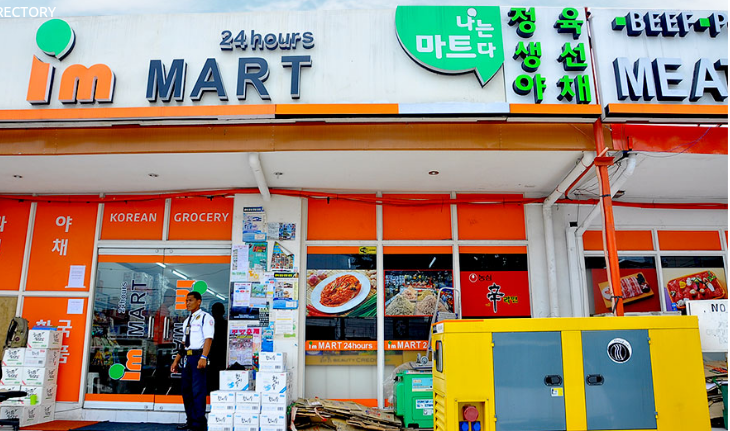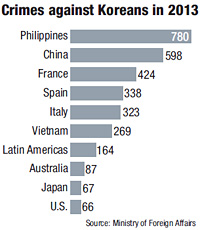
Six months ago, I wrote a post as a reply to an article I read in The Korea Times entitled “Philippines Turns into Death Trap for Koreans”. The article talks about the growing concern among Koreans after news of the death of a Korean student who was abducted in Pasay City hit the headlines. Prior to the tragic news, there had been a number of crimes committed against Koreans living in the Philippines that has brought trepidation to the Korean community.
In September 2011, a 59-year old Korean businessman named Hyun Hur was shot and killed, while his Filipino driver was wounded after they were attacked by two men on a motorcycle along Ortigas Avenue. In March of last year, the lifeless body of a Korean man, identified as Kim Ji-hun, 38 years old, was found inside a water tank at a condominium inParanaque. He was last seen in the morning of March 26 running barefoot outside the condominium unit he shared with his Filipina live-in partner. In April, another Korean died and two were injured in a shooting in Angeles City. The victims were all businessmen involved in currency exchange and were believed to be carrying a lot of cash at the time of the crime. In 2013, 12 Koreans were reportedly shot or stabbed to death, but to this day, the suspects remain at large. According to the Foreign Ministry, 44 percent of 160 murder cases of Koreans residing abroad happened in the Philippines. This year, there have already been reports of nine Koreans murdered from January to July and two cases of abduction.
It’s no surprise that according to the data compiled by the Ministry of Foreign Affairs, the Philippines is the most dangerous country for Koreans in 2013, with a total of 780 crimes committed against them.
A recent article from The Korea Times says, this the first time since 2011 that crime rates against Koreans in the Philippines outnumbered those in China where there are more Koreans visiting every year.
Twenty five percent of the 4.7-million tourists who arrived in the Philippines last year are Koreans. Most of them are students who have come to the country to learn English. Korean parents send their children here to learn English, because the tuition fee is more affordable compared to other English-speaking countries; nevertheless, it offers the same high quality English language education. As the number of Korean residents grew over the years, many Korean entrepreneurs started businesses here that cater to fellow Koreans. Now you can find a lot of Korean restaurants, grocery stores, shops, salons, hotels, academies, churches and other Korean-owned businesses anywhere in the Philippines. In Angeles City’s Korean Town alone, there are about 150 business establishments owned by Koreans.
 (One of the several Korean marts in Angeles City's Korean Town (Photo taken from clarkisit.com)
(One of the several Korean marts in Angeles City's Korean Town (Photo taken from clarkisit.com)
The cost of living in the Philippines is cheaper than in Korea, so some Korean families settle here to enjoy a more affluent lifestyle. As my husband puts it, the savings of a typical “salary man” in Korea can go a long way in the Philippines. This is also one of the main reasons why retirees from Korea, who are on fixed pensions, come to live here. Some Korean residents in the Philippines are missionaries; some are employees of big companies owned by Koreans.
Although Koreans still top the list of foreigners coming to the Philippines, the number of Korean visitors dropped this year. Obviously, some of them no longer feel safe in this country… and we can’t blame them. To be honest, when my husband decided to start a business in the Philippines and stay here for a year, I was concerned for his safety. My apprehension doubled when several shootings targeting Korean businessmen occurred in my hometown.
I used to tell Koreans good things about the Philippines every time they ask me about my country… and yes, there are so many wonderful things about this country and its people that a foreigner will learn to love… but is it safe for Koreans? Is it safe for outsiders? Now I don’t think that I can say yes, because the truth is, even Filipinos don’t feel safe in their own country anymore. There is just too much criminality and injustice that the leaders can’t iron out.
Though the Korean Embassy in Manila has already expressed grave concern over the increasing number of crimes against its citizens and sought the help of the Philippine government, no “real” solution has been enunciated. I am not trying to dissuade Koreans (or any other foreigners) from visiting the Philippines, but I would like to remind everyone who comes here to be MORE vigilant.
Here are some ways a Korean can stay safe in the Philippines:
- If you are a first-time tourist or a solo traveler, stick to your itinerary. It is best to have a qualified tour guide or a friend to show you around.
- Avoid going to unfamiliar places, but if you really have to go to a place you have no idea about, let’s say, you are looking for an adventure and you’d like to go backpacking, NEVER do it alone. It is much safer traveling around the Philippines (or anywhere in the world) in groups or with a friend… and as they say, the more the merrier.
- Make friends with Filipinos you see on a regular basis, like a classmate or a teacher in school, an office mate a church mate etc., NOT just anybody you have met on-line, in a bar or at the mall. Filipinos are known and loved for their amiability and hospitality, but sometimes these can be used as lure by swindlers. I know most Koreans would rather have Korean friends to hang out with than socialize with the locals, but having a trustworthy Filipino friend can help you understand Philippine culture better.
- If you are coming home from school late at night, have a friend walk you home, or ask a family member or your guardian to pick you up. Avoid taxis or tricycles if you are by yourself. If this isn’t possible, call someone you know; give that person the plate number of the taxi or the tricycle that you are riding. Let the driver know that you are informing someone of the vehicle’s plate number or make the phone call while inside the vehicle, so the driver can hear the conversation. That way, he won’t do anything foolish, because he knows he won’t get away with it. This may be offensive to drivers who don’t have any hidden agenda, but it’s better to be safe than sorry.
- Flashing your smart phones and expensive gadgets in public places is a big no-no. In Korea, you can use your phone anywhere and no one will give a damn, but if you do that in the Philippines, you will be attracting thieves.
- If you are withdrawing a huge amount of money from the bank or changing your foreign cash to peso, make sure that no one is following you. Have someone assist you, so this person can act as your second pair of eyes.
- If you are withdrawing money from the ATM, use ATM’s with assigned security guards or one that is within the bank. ATM’s in the mall are no longer safe because of scammers posing as shoppers. My sister almost fell victim to a modus operandi while she was withdrawing cash from an ATM in a shopping center in Angeles City, but good thing she knows better.
- Be wary of strangers who are too friendly, for instance, those who offer you free stuff or promos. They could be scammers, too.
- Avoid crowded places and packed public transport. They are magnets for pickpockets. My brother-in-law and his wife, both Koreans, have been in the Philippines numerous times, but it was only two years ago when they encountered pickpockets in the mall, and they don’t even know how it happened! Nearly 600 USD was stolen from them. Last year, my husband and I were victimized by sneak thieves, too. We were riding a jeepney on our way home. One of the passengers sitting in front of us asked my husband what time it was. Oblivious to what the man was really trying to do, my husband answered him. After a few stops, the man and another passenger sitting next to my husband got off. Later, my husband realized that his wallet was empty.
(Just so you know how skilled and creative pickpockets are here, watch this video. This was in the news a few days ago. The incident happened inside the mall.)

- Do not get wasted outside your home. If in Korea you can get drunk, sleep anywhere and remain unscathed, here in the Philippines, you will only endanger your life if you do that.
- Don’t make enemies here, especially among your fellow Koreans. This year, a Korean was kidnapped and killed by a fellow Korean in Cavite. According to the investigation, the victim, Yang Kwang Sung and his companion, Jeong In Seong, double-crossed their employer, Shin Beom Sik. With the help of his Filipina live-in partner, Shin hired Filipinos to abduct, beat up and shoot the two Koreans. Jeong survived the ordeal. Shin and his live-in partner are in police custody, but authorities are still looking for three others involved in the crime. Last year, the arrest of some of the members of a Korean kidnap gang in the Philippines made headlines. The group’s modus operandi was to offer their services as tour guides to fellow Koreans who want to visit the Philippines, and after gaining the tourists’ trust, they would kidnap them and ask their families for ransom.

